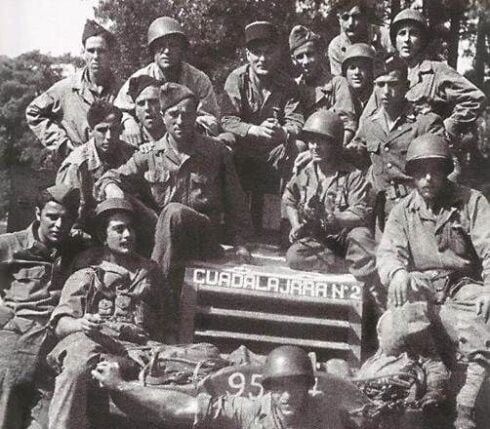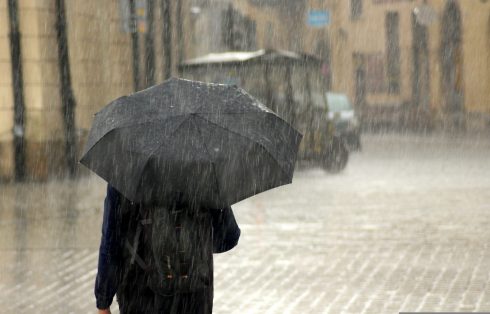ACROSS Europe, people are celebrating VE Day.
Some 80 years ago today – May 8, 1945 – the guns fell silent across Europe. Victory in Europe Day marked the end of World War II on the continent, as Nazi Germany surrendered to the Allied forces.
It was a day of relief, of tears, of jubilation. Across the continent, bells rang, soldiers wept, and civilians poured into the streets.
But in Spain, there were no parades. No victory speeches. No homecoming for troops.
And today, apart from events organised by expat associations like the Royal British Legion there are no celebrations in the country.
Spain, under Francisco Franco, had remained officially neutral throughout the war. The wounds of its own civil conflict were still fresh, and its authoritarian regime stood apart from the Allied cause.
Yet history tells a more complex story. While the Spanish state sat out the Second World War, thousands of Spaniards did not.
Many found themselves drawn back into battle, carrying forward the fight they had lost at home – on foreign soil, under foreign flags.
La Nueve: Spain’s hidden liberators of Paris
One of the most extraordinary chapters belongs to La Nueve – the Ninth Company of General Leclerc’s 2nd Armored Division of the Free French Army.

Composed almost entirely of Spanish Republican exiles who had fled Franco’s regime, La Nueve had seen battle long before donning French uniforms. These were men hardened by the Spanish Civil War, driven not by duty to France, but by a burning refusal to let fascism triumph again.

On August 24, 1944, La Nueve was the first Allied unit to enter Paris. Riding armoured vehicles with names like Guadalajara and Madrid, they stormed the city ahead of their division. To many Parisians, the liberation had arrived in the form of Spanish soldiers.
For decades, their contribution was overlooked. But today, their memory lives on in plaques, in the renamed ‘Allée de la Nueve’ near the Seine, and in the hearts of historians who continue to uncover their role in Europe’s freedom.
On the Eastern front: Spaniards in German uniform
In a bitter irony, other Spaniards were fighting on the opposite side.
The Blue Division (División Azul) was a volunteer force. Through rotation, as many as 45,000 Spanish soldiers served on the Eastern Front.

The casualties of the Blue Division and its successors included 4,954 men killed and 8,700 wounded.
Spain’s dictator, Franco, had resisted Hitler’s calls for the country to join the Axis and remained neutral, but he did consent to a ‘gesture of support’, under the pretense of fighting communism rather than aligning politically with Germany.

These men fought primarily on the Eastern Front, enduring the horrors of the Siege of Leningrad and the brutal winters of Russia. Many perished far from home. Some believed they were protecting Europe from Bolshevism; others were driven by desperation or loyalty to Franco.
The Resistance fighters: Shadows in the forest
Then there were those who didn’t wear formal uniforms at all – men and women who joined the French Resistance, the British Army, and even Soviet partisan groups. These Spanish exiles – many of them former republicans – fought as saboteurs, couriers, and freedom fighters. They laid charges on railway lines, gathered intelligence for the Allies, and died nameless in mountain passes and forests along the border with occupied France.
Many also aided on the ‘escape routes’ helping downed airmen and Jewish civilians flee from the Nazi forces.
Among them were the Spanish Maquis, guerrilla fighters who dreamed not only of defeating Hitler but of one day returning to liberate Spain itself from dictatorship. That day would not come in many of the fighters’ lifetimes.
A war continued by other means
For many Spaniards, World War II was not a new fight but a continuation of the one they had already lost. The end of the Spanish Civil War in 1939 had exiled tens of thousands. When Hitler invaded France and the Axis rose to dominance, these exiles recognised the same threat in a new uniform.
Today, as Europe honours those who stood against tyranny 80 years ago, it is worth remembering the Spaniards who fought not because their country sent them, but because conscience called them.
Their names are not always listed in official histories, but their sacrifice is woven into the freedom Europe celebrates on this day.
Not all soldiers wear their nation’s flag. Not all victories are won at home. But history remembers.
Click here to read more Spain News from The Olive Press.








